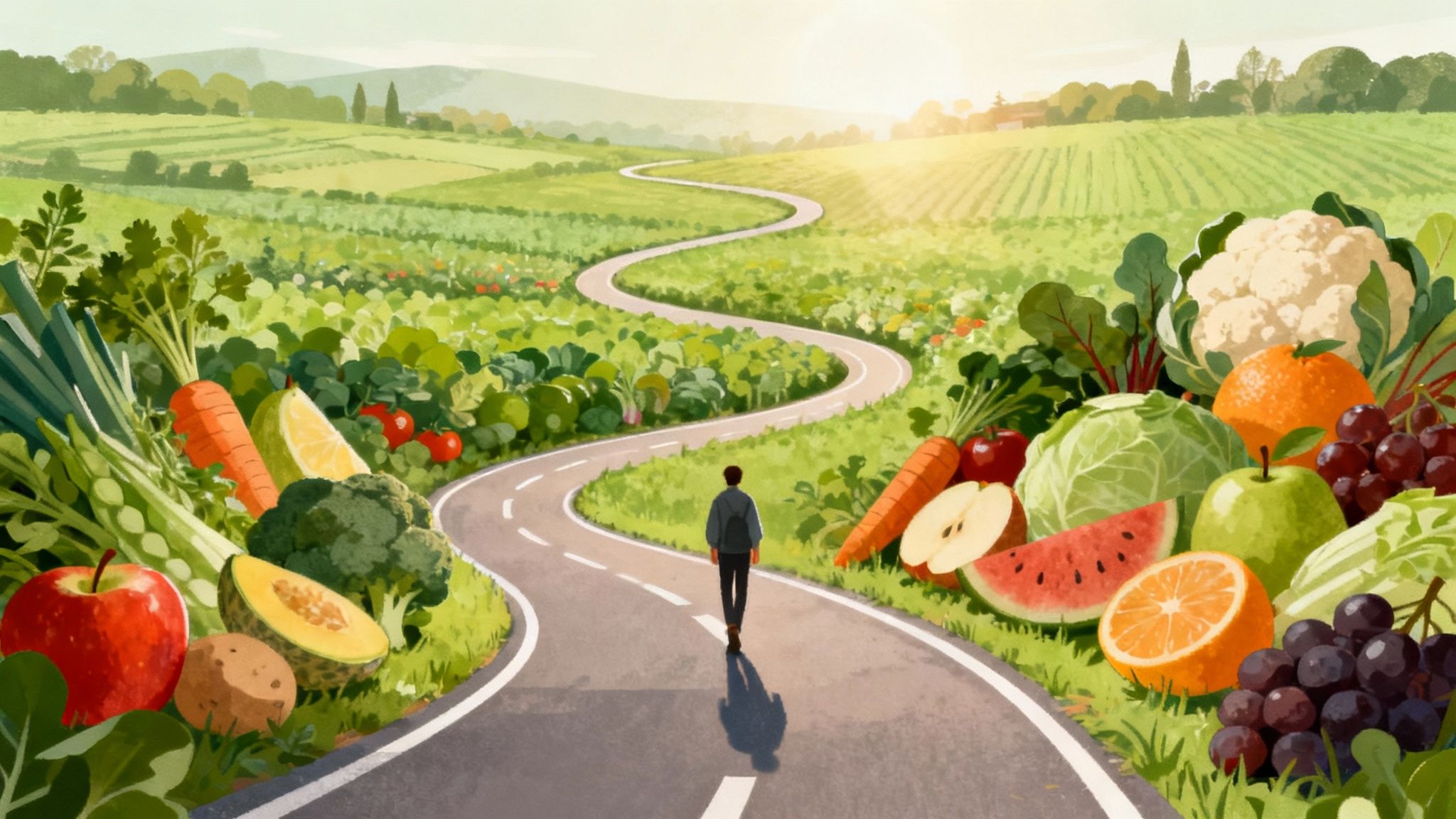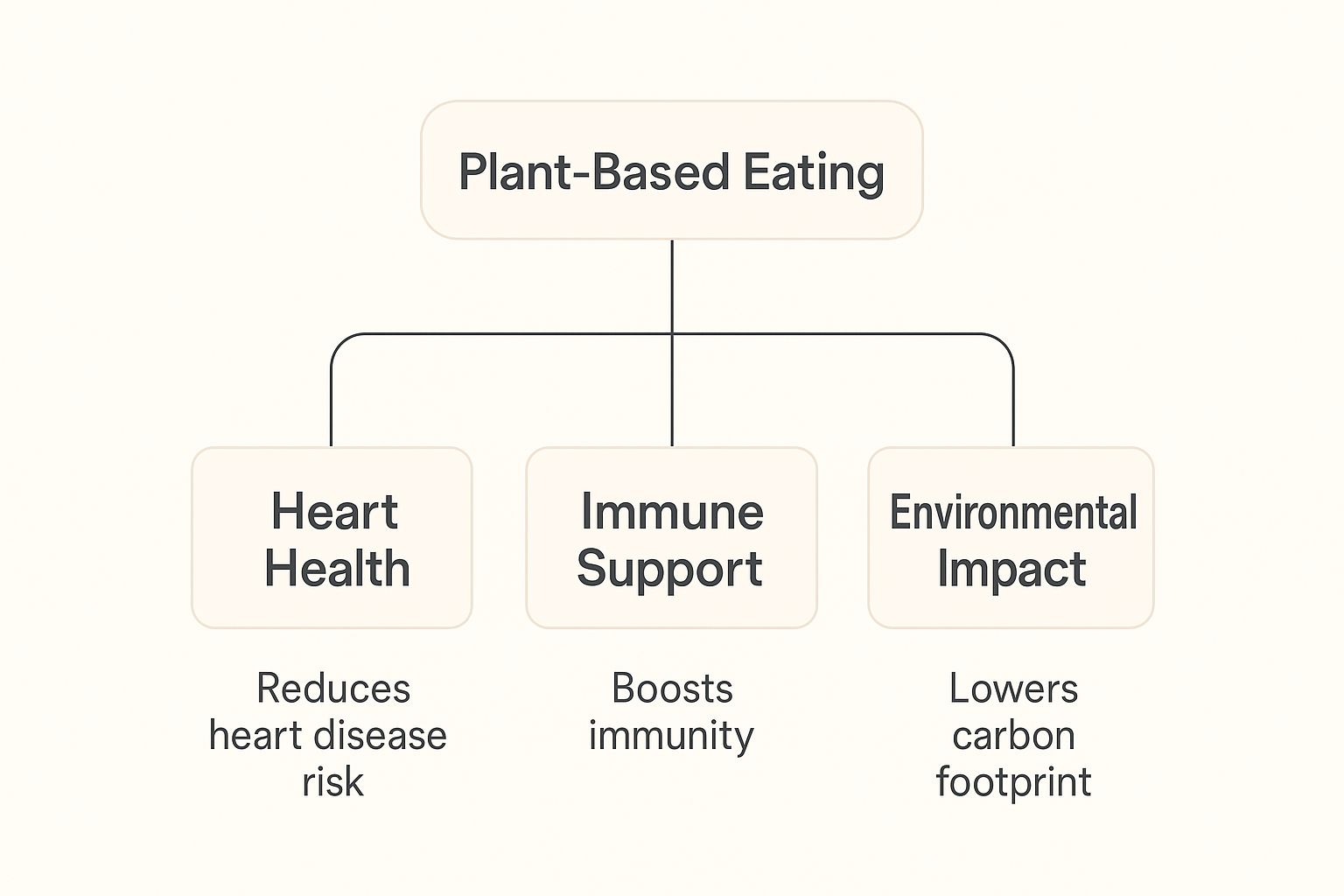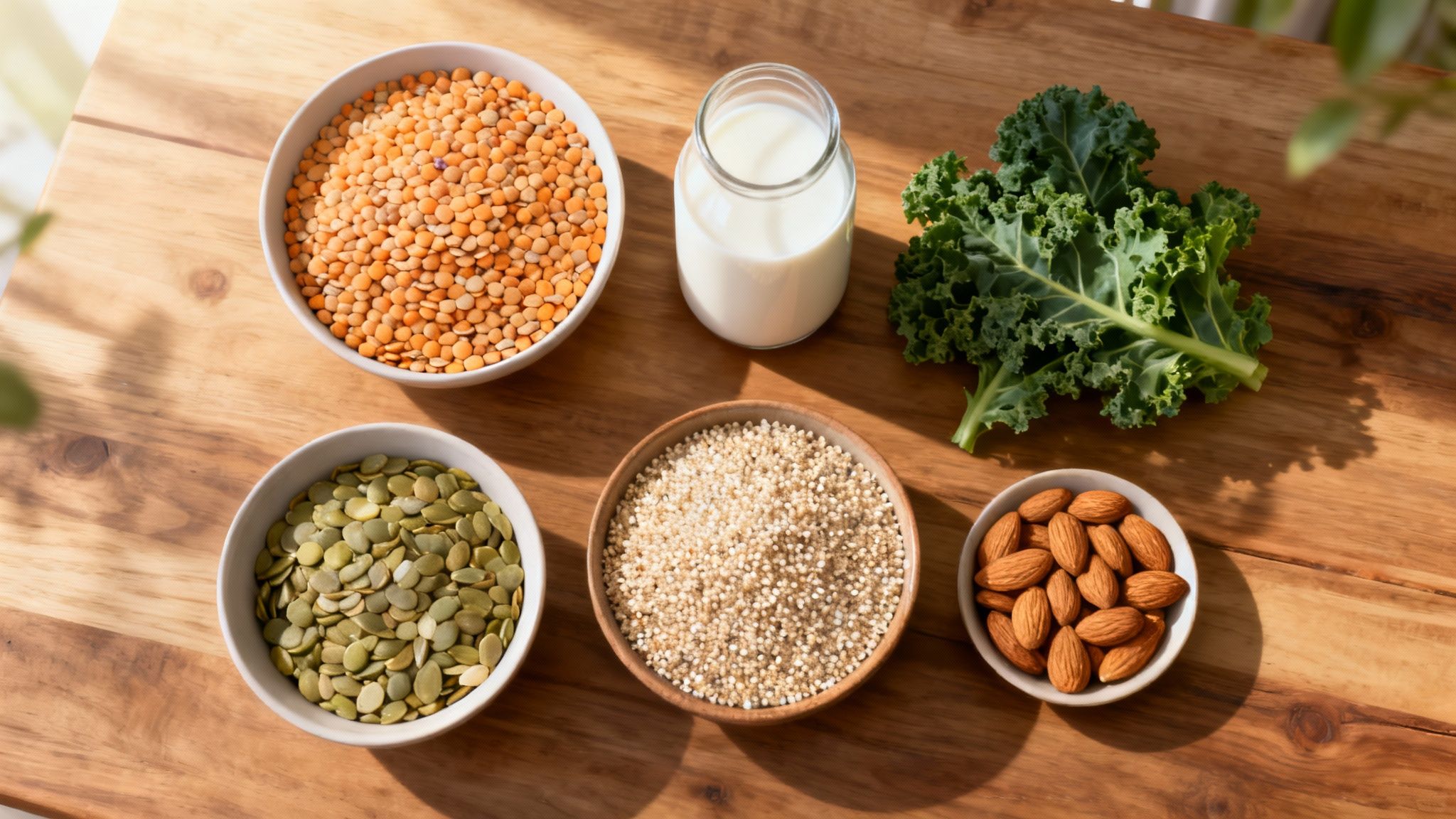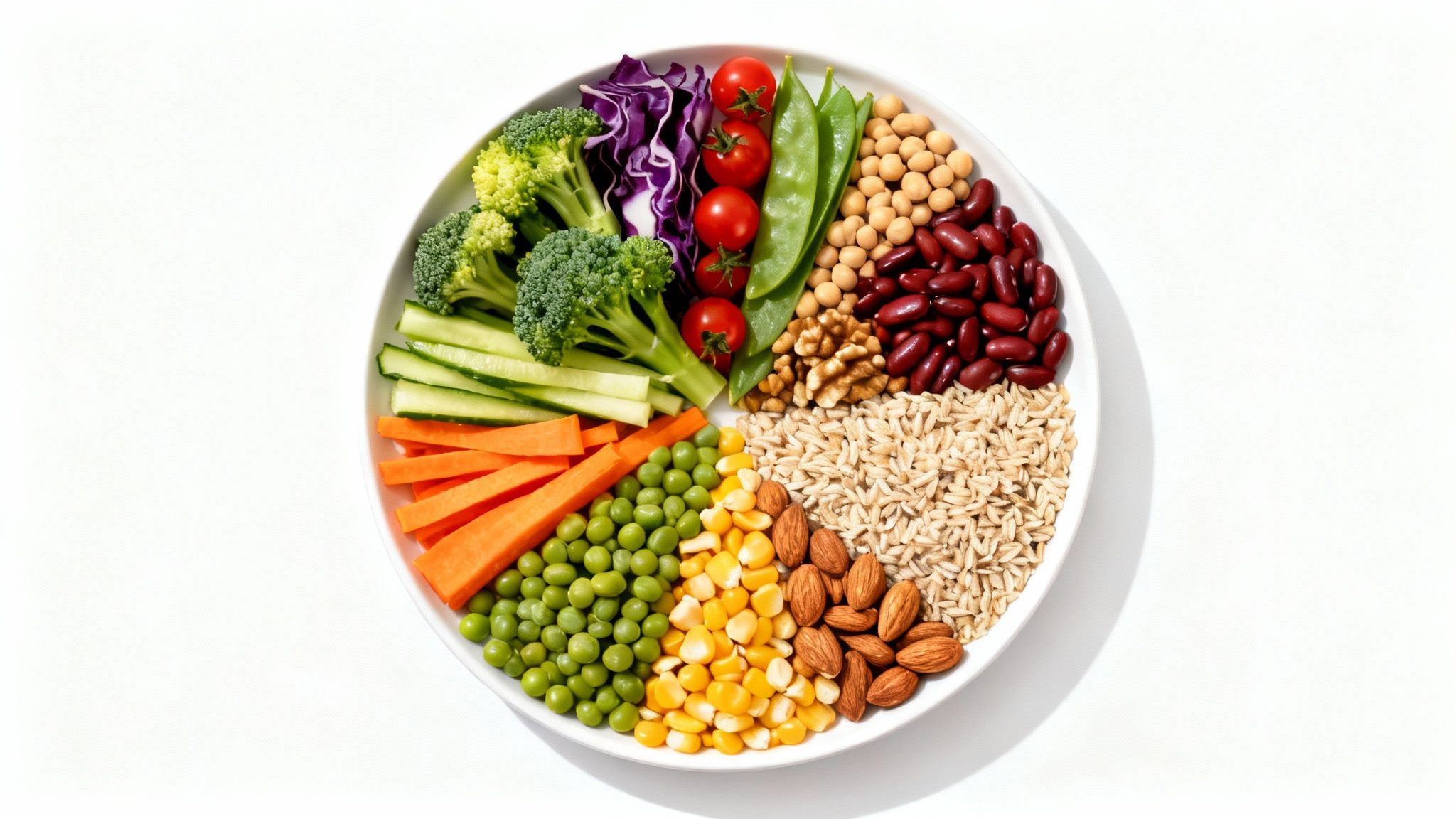A Plant Based Nutrition Guide for Gut Health
Ever feel like your stomach inflates like a balloon by afternoon after a super-healthy lunch? You’re not alone—and it’s not just what you ate. Shifting to a plant-based diet is amazing, but it can come with some, let's say, gassy frustrations.
Think of this guide as a friendly chat with a friend who’s been there. We're going to walk you through everything you need to know to make plant-based nutrition work for you and your real life. We'll show you how to get all the right nutrients, build delicious, satisfying meals that leave you feeling energized, and most importantly, how to keep your gut happy along the way. This is your personal roadmap to a thriving, plant-powered life without the dreaded bloat.
Your Journey to Plant-Based Eating Starts Here

Have you ever felt a little lost trying to figure out a plant-based diet? You hear about all the incredible benefits—more energy, glowing skin, better digestion—but figuring out the how can feel like a huge hurdle. Trust me, we get it.
This guide is here to offer practical advice and make plant-based nutrition work for you. No rigid rules or complicated science, we promise. This journey is all about adding abundance to your plate, not taking things away.
What to Expect in This Guide
We’ll walk you through everything you need to know, from getting all the right nutrients to building delicious, satisfying meals that leave you feeling energized, not deprived. Together, we’ll explore:
- The real benefits of eating more plants, from a happy gut to a stronger immune system.
- How to get all your key nutrients (yes, that includes protein!) without stressing over it.
- Simple meal-building strategies that actually fit into a busy schedule.
- Practical tips for supporting your digestion as you introduce more awesome, fiber-rich foods.
A Path That Works For You
Feeling confident in your food choices is the secret to making this a long-term lifestyle. The real goal is to build sustainable habits that you genuinely enjoy. For most people, a slow and steady approach works wonders. If you're looking for a step-by-step plan, our guide on how to transition to a vegan diet has some great, practical tips to make the switch feel easy.
This isn’t just about what you eat; it’s about how you feel. It's about creating a lifestyle that supports your energy, calms your digestion, and helps you thrive from the inside out. For those wanting truly personalized guidance and culinary support, you might even explore specialized vegan and vegetarian private chef services to help ease the transition.
Remember: Small, consistent steps lead to big changes. You don't have to be perfect overnight. The goal is progress, not perfection.
Ready to start feeling your absolute best? Let's dive in. We’ll show you just how simple, satisfying, and powerful eating more plants can be.
What Plant-Based Nutrition Actually Means
Let’s clear up some of the noise right away. When people hear “plant-based,” they often picture a strict, all-or-nothing leap into veganism overnight. I do NOT think you need to slap a label on how you eat or chase some idea of perfection.
Think of it more like a spectrum. It’s a flexible way of eating, not a rigid rulebook. The whole idea is simply to shift the focus of your plate toward more foods that come from plants-things like vibrant fruits, hearty vegetables, whole grains, nuts, seeds, and legumes. It’s about crowding your plate with an abundance of goodness, not just taking things away.
It's a Spectrum, Not a Switch
The best part about a plant-based approach is that you get to define it. There are so many ways to lean into it, and you can find a rhythm that feels both sustainable and genuinely enjoyable for you.
Here are a few common ways people approach it:
- Flexitarian: This is a fantastic place to start. You’re eating mostly plant-based, but you still enjoy meat, poultry, or fish every now and then. The focus is on reduction, not total elimination.
- Vegetarian: This means cutting out meat, poultry, and fish, but usually keeping dairy and eggs in the picture. It’s a big step toward a fully plant-centric way of eating.
- Vegan: This is the most committed end of the spectrum, where all animal products are off the table-including meat, dairy, eggs, and even honey.
The real key is finding what works for your body, your lifestyle, and your personal goals. You might start out as a flexitarian and find yourself naturally moving toward a more plant-exclusive diet over time. Or, you might discover that a mostly plant-based plate with occasional animal products is your sweet spot.
The goal isn’t a label; it’s a feeling. It's about fueling your body in a way that gives you more energy, better digestion, and a greater sense of well-being.
The Foundational Principles
No matter where you land on that spectrum, the core principles of a healthy plant based nutrition guide are the same. It’s much less about what you're cutting out and far more about what you're piling on to nourish yourself from the inside out.
Think of it like building a house. You have to start with a solid foundation. For plant-based eating, that foundation is built from whole, minimally processed foods that come straight from the earth. These are the foods packed with the fiber, vitamins, minerals, and phytonutrients that work together to keep you thriving.
A 2024 review from Harvard School of Public Health noted that plant-based diets are linked to lower risks of heart disease, type 2 diabetes, and certain cancers. What does this mean for you? It means that every plant-forward meal is a direct investment in your long-term health.
Ultimately, this lifestyle is about one simple thing: eating more real food that grew in the ground. It’s choosing lentil soup over a hot dog or reaching for an apple instead of a candy bar. Every one of those small choices adds up, creating a powerful, positive ripple effect on your long-term health and your energy day-to-day.
The Real Benefits of Eating More Plants
So, why is everyone from your best friend to your favorite wellness blogger suddenly talking about eating more plants? It's not just another trend. The benefits are simply too good to ignore, and we're not just talking about long-term goals like heart health. We're talking about the everyday wins that make you feel genuinely amazing.
Shifting your plate to feature more plants can lead to clearer skin, more restful sleep, and finally saying goodbye to that dreaded afternoon energy slump. It’s about feeling vibrant and alive, day in and day out.
Boost Your Heart and Immune System
Let's start with the heavy hitters. A diet built around whole plant foods is one of the most powerful things you can do for your heart. Why? Plant-based foods are naturally low in saturated fat and are completely free of dietary cholesterol. They’re also loaded with fiber, which acts a bit like a sponge, helping to soak up and remove excess cholesterol from your system.
But it doesn't stop there. Fruits, vegetables, nuts, and seeds are packed with antioxidants and anti-inflammatory compounds. Think of these as your body's personal security team, fighting off cellular damage and keeping your immune system strong and ready for action.
- For your heart: Fiber and healthy fats from sources like avocados and walnuts are fantastic for helping maintain healthy cholesterol levels.
- For your immunity: Vitamins like C (found in citrus and bell peppers) and A (in sweet potatoes and carrots) are absolutely essential for a robust immune response.
This infographic does a great job of breaking down the core benefits, connecting the dots between heart health, immune support, and even the positive impact on our environment.

As you can see, choosing to eat more plants creates a positive ripple effect that benefits your personal health and the planet's well-being.
Achieve Sustainable Weight Management
One of the most common worries I hear is, "Will I feel hungry all the time?" And I get it. Nobody wants to feel deprived. But here’s the wonderful secret about whole plant foods: they are incredibly satisfying.
Plants are typically high in both fiber and water, which gives them a lot of volume without a ton of calories. This means you can eat generous, filling portions that keep you satisfied for hours. It’s a natural way to manage your weight without ever feeling like you're on a restrictive diet. The focus is on nourishment, not just numbers on a scale.
A Lighter Footprint on the Planet
The upside of eating more plants extends far beyond our own bodies. Choosing plant-based meals is one of the most direct and impactful ways an individual can contribute to a healthier planet. Animal agriculture is a major driver of deforestation, water consumption, and greenhouse gas emissions.
By shifting toward plant sources of protein like beans, lentils, and tofu, we can significantly reduce our environmental footprint. It’s a powerful feeling to know that your food choices are not only healing you but are also helping to heal the earth.
Global interest in plant-based nutrition is surging, with younger generations leading the charge. Two-thirds of consumers want more plant-based meals, driven by a powerful trio of benefits: reduced disease risk, a potential 75% cut in your carbon footprint, and grocery savings up to 34%. It's a rare win-win-win for your health, the environment, and your wallet. You can explore the full data on this growing movement to learn more.
Nourish Your Gut, Transform Your Health
At the very heart of all these benefits lies one crucial area: your gut. The trillions of microbes living in your digestive tract, known as your gut microbiome, are the true foundation of your overall wellness. And guess what their favorite food is? Fiber!
A diverse, plant-rich diet feeds the beneficial bacteria in your gut, helping them thrive. When your gut is happy, the positive effects ripple outward through your entire body.
- Smoother Digestion: Say goodbye to frustrating bloating and discomfort.
- Better Mood: A healthy gut is directly linked to improved mental clarity and mood stability.
- Stronger Immunity: It's no surprise that a huge portion of your immune system actually resides in your gut.
Eating a wide variety of plants ensures you’re feeding a diverse community of gut microbes, which is the absolute key to a resilient, healthy internal ecosystem. This is the cornerstone of any effective plant based nutrition guide.
Getting All Your Nutrients On A Plant Based Diet

Let's start by tackling the million-dollar question: "But where do you get your protein?" It’s a valid concern and one we hear all the time. The great news is that a well-planned plant-based diet is bursting with everything your body needs to thrive, but it does mean being a bit more mindful.
Don’t worry, we're here to make it simple. Think of this as your practical cheat sheet for the key nutrients you'll want to keep an eye on. No dense charts or confusing jargon, just straightforward advice and delicious food ideas.
Nailing Your Protein Needs
First up, protein. It’s the essential building block for everything from your muscles and skin to your hormones. And contrary to popular belief, plants are absolutely loaded with it. The secret is simply variety.
Many plant proteins are considered "incomplete," which just means they don't contain all nine essential amino acids by themselves. But here’s the easy fix: just combine different plant foods throughout your day. Think of it less like a strict science experiment and more like a fun puzzle.
Here are some protein powerhouses to start adding to your rotation:
- Legumes: Lentils, chickpeas, black beans, and edamame are not only affordable but incredibly versatile.
- Whole Grains: Quinoa is a real standout here because it's a complete protein all on its own! Brown rice, oats, and whole-wheat bread are also fantastic sources.
- Nuts and Seeds: Almonds, walnuts, chia seeds, and hemp seeds are perfect for snacking or tossing into smoothies and salads.
- Soy Products: Tofu, tempeh, and soy milk are amazing, protein-rich staples that have been a cornerstone of healthy diets for centuries.
A simple lunch of quinoa and black beans or a mid-afternoon snack of whole-grain toast with peanut butter easily gives you that complete protein profile. It really is that easy.
Iron And Calcium Without The Dairy Or Meat
Iron is the key to your energy levels, and calcium is non-negotiable for strong bones. The good news? You definitely don't need red meat or milk to get enough of either.
For iron, load up on dark leafy greens like spinach and kale, lentils, and fortified cereals. To seriously boost your body's absorption, always pair these iron-rich foods with a source of vitamin C. A simple squeeze of lemon over your spinach salad or adding some bell peppers to your lentil soup makes a world of difference.
When it comes to calcium, it's time to think beyond the dairy aisle. Fortified plant milks (like almond or soy), tofu made with calcium sulfate, broccoli, and almonds are all brilliant sources.
Omega-3s For Brain Health
Omega-3 fatty acids are absolutely vital for keeping your brain sharp and taming inflammation. While fish is often touted as the go-to source, you can get exactly what you need from plants.
Flaxseeds, chia seeds, hemp seeds, and walnuts are your best friends here. Just one or two tablespoons a day-sprinkled on oatmeal or blended into a smoothie-can help you hit your goals. For a deeper dive, feel free to check out our guide on the best vegan sources of omega-3s to learn more.
A Note from Sam, Yuve's Founder: "When I first went plant-based, my energy levels soared, but I noticed a slight brain fog creep in after a few months. I was eating tons of healthy food but had completely overlooked B12. It was a real wake-up call that even the best diet needs a safety net. That’s why we created our B12 spray—to make it foolproof for everyone."
The One Nutrient You Must Supplement: Vitamin B12
Okay, this is the one non-negotiable part of a healthy, thriving plant-based diet: you must supplement with vitamin B12.
Vitamin B12 is essential for nerve function and creating healthy red blood cells. Here’s the catch: it's made by microorganisms in the soil, so it's not naturally found in plant foods. This isn't a flaw in a plant-based diet; it's just a simple biological fact of modern life.
Please don't make the mistake of waiting until you feel symptoms of a deficiency. The solution is easy and proactive. A reliable supplement is your nutritional safety net, ensuring you never have to second-guess this crucial nutrient gap.
This is exactly where the Yuve Vegan Vitamin B12 Spray becomes an essential part of your daily routine. It’s a fast-absorbing, easy-to-use spray that ensures you’re getting the B12 you need to feel energized and focused every single day. Think of it not as an optional extra, but as a core component of a smart, thriving plant-based lifestyle.
Building Your Perfect Plant-Based Plate

Knowing the "why" is great, but let's get real—it's the daily "how" that truly makes a difference. How do you actually put together a delicious, balanced meal without getting overwhelmed or needing a nutrition degree? It's way easier than it sounds. We're going to show you a simple visual trick that makes every meal a winner.
Forget about obsessively counting calories or tracking every last macro. Instead, we're going to embrace a much more intuitive approach: The Plant-Based Plate Method. Think of it as your foolproof visual guide to getting the right mix of protein, complex carbs, and healthy fats every single time.
The Simple Plate Method
Picture your plate. Now, divide it into three sections. That’s it. This simple framework takes all the guesswork out of mealtime, ensuring you feel full, energized, and satisfied.
Here’s how you build it:
- ½ Your Plate - Non-Starchy Vegetables: This is where all the vibrant color and nutrients come from! Load up this half with things like leafy greens, broccoli, bell peppers, zucchini, and cauliflower. These are your powerhouse foods, packed with fiber, vitamins, and antioxidants.
- ¼ Your Plate - Plant Protein: This section provides staying power. Fill it with hearty, protein-rich foods like lentils, chickpeas, black beans, tofu, or tempeh.
- ¼ Your Plate - Complex Carbs & Healthy Fats: This is your clean energy source. Think whole grains like quinoa, brown rice, or oats. You can also add your healthy fats here, like a sprinkle of seeds or a few slices of avocado.
This isn't a rigid rule, but more of a flexible guideline. Some meals, like a hearty lentil bolognese, will naturally mix everything together, and that’s perfectly fine! The real goal is to get comfortable visualizing what a balanced meal looks like.
A Day of Delicious Plant-Based Eating
So, what does this actually look like in a real day? Let's walk through a sample menu of easy, satisfying meals that nail the Plate Method.
Energizing Morning Smoothie:
- Protein: 1 scoop of vegan protein powder or 2 tablespoons of hemp seeds.
- Veggies: A large handful of spinach (we promise, you won’t even taste it!).
- Carbs/Fats: ½ banana and 1 tablespoon of almond butter.
- Liquid: 1 cup of unsweetened almond milk.
Hearty Lentil & Quinoa Bowl for Lunch:
- Protein/Carbs: 1 cup of cooked lentils and quinoa mixed together.
- Veggies: A generous portion of roasted broccoli and bell peppers.
- Fats: A drizzle of tahini dressing.
Satisfying Sweet Potato & Black Bean Tacos for Dinner:
- Protein: ½ cup of seasoned black beans.
- Carbs: ½ cup of roasted sweet potato cubes served in corn tortillas.
- Veggies: Topped with shredded lettuce, diced tomatoes, and onions.
- Fats: A few slices of fresh avocado.
A Quick Story from Sam, Yuve's Founder: "When I first switched to a plant-based diet, my digestion was all over the place. I was eating healthy foods, but I had no structure. Learning to plan my meals using a simple plate method was a total game-changer. It helped me balance my fiber intake and finally get rid of the bloating. It taught me that how you combine foods is just as important as what you eat."
Making It Work For Your Busy Life
The real secret to sticking with it? Making healthy eating fit into your actual, busy schedule. And for that, meal prepping is your superpower.
Just an hour on a Sunday can set you up for a week of success:
- Batch Cook Grains: Make a big pot of quinoa or brown rice to use in bowls and salads all week.
- Prep Your Veggies: Chop onions, bell peppers, and broccoli so they’re ready to be tossed into any meal.
- Mix a Sauce: Whisk together a simple vinaigrette or tahini dressing.
These small steps mean that assembling a healthy plate takes minutes, not hours. As you start building your meals, you might also find yourself adapting old favorite recipes. For instance, if you love to bake, looking up good egg substitutes for baking can help you make your go-to treats vegan-friendly without a fuss.
How to Support Your Gut Health Journey
Switching to a plant-based diet is fantastic for your gut microbiome. But let's get real for a minute—the transition can sometimes cause a little… rumbling. And then, dun, dun, dun—unwelcome gas. Yikes! We've all been there.
When you suddenly up your intake of fiber, even from the healthiest foods, it's common to experience some temporary bloating. I want to be crystal clear on this: it is totally normal! Your gut is just adjusting to a wonderful new wave of nourishment. Think of it as a new workout routine for your digestive system; it needs a moment to build up its strength.
Go Slow and Steady with Fiber
The biggest mistake we see people make is jumping from zero to one hundred with high-fiber foods overnight. Your enthusiasm is awesome, but your gut will thank you for a more gradual introduction.
This approach gives the good bacteria in your gut the time they need to multiply and adapt, which is the secret to long-term digestive happiness.
- Start Small: Begin by adding just a few tablespoons of lentils to a soup or a small side of black beans with your lunch.
- Rotate Your Foods: Try not to eat the exact same high-fiber foods every single day. Variety is your best tool for building a diverse and resilient gut microbiome.
- Drink Plenty of Water: Fiber needs water to work its magic. It acts like a sponge, and without enough hydration, things can actually get a bit stuck. Aim to sip water consistently all day long.
The Power of Proactive Digestive Support
Even when you take it slow and steady, your digestive system can still use a little backup, especially when you're digging into a particularly fiber-rich meal. This is where a high-quality digestive enzyme becomes your absolute best friend. We're not kidding—it's a game-changer.
Think of digestive enzymes as tiny helpers that work with your body’s own enzymes to break down food more effectively. They are especially good at targeting the complex carbohydrates, proteins, and fats in plant foods that can sometimes be a challenge for your system to tackle all at once. For more on creating a healthy gut environment, we've outlined some great information about the best probiotics for vegans in another post.
Taking a digestive enzyme before you eat isn't a sign that your stomach is "weak." It’s a smart, proactive step to head off bloating before it even has a chance to start. This ensures you’re absorbing all those amazing nutrients from your food, making your transition to plant-based eating smooth and enjoyable.
Your Secret Weapon Against Bloating
This is precisely why we developed Yuve Vegan Digestive Enzymes. We formulated them specifically to help your body break down plant fibers, fats, and proteins more efficiently. Taking one before a big salad, a hearty bean chili, or a veggie-packed stir-fry is a simple habit that makes a world of difference.
It's all about enjoying your food without worrying about that dreaded afternoon bloat. Instead of feeling sluggish and uncomfortable, you'll feel light, energized, and confident, knowing you’re getting all the goodness from your incredible plant-based meals. This is the key to making this lifestyle feel just as good as it is for you.
Your Quick-Start Action Plan
Feeling inspired? Here are a few simple, actionable steps you can take this week to get started on your plant-based journey.
- Try "Meatless Monday": Dedicate one day a week to eating fully plant-based. It's a low-pressure way to experiment with new recipes.
- Swap Your Milk: Try almond, soy, or oat milk in your morning coffee or cereal. It's an easy switch with a big impact.
- Add One New Veggie: Challenge yourself to pick up one vegetable at the grocery store that you've never tried before.
- Grab a Smart Supplement: Don't wait. Make a reliable B12 supplement a non-negotiable part of your daily routine from day one. Our Yuve Vegan Vitamin B12 Spray makes this foolproof.
Got Questions About Plant-Based Eating? We’ve Got Answers.
We've covered a lot, but you might still have a few things on your mind. That’s perfectly okay! Let's tackle some of the most common questions people have when they're first dipping their toes into the plant-based world.
"Will I Be Hungry All The Time?"
Absolutely not! This is probably the biggest misconception out there. The trick is knowing what to eat. Plant-based foods like beans, lentils, whole grains, and even potatoes are loaded with fiber and protein, which are the two things that tell your body, "Hey, I'm full and satisfied."
If you build your meals like we talked about earlier—with a solid base of these high-fiber, protein-packed foods—you’ll be surprised at how long you feel energized and full. It’s not about eating less; it’s about eating smarter.
"Isn't a Plant-Based Diet Super Expensive?"
It can be, but it really doesn't have to be. In fact, a study published in The Lancet Planetary Health found that sustainable eating patterns, including plant-based diets, could reduce food costs.
The secret is to build your meals around whole-food staples. Think dried beans, lentils, oats, potatoes, and whatever fruits and veggies are in season. These are almost always cheaper than meat, cheese, and all those fancy processed vegan products.
"How Quickly Will I Notice a Difference?"
Everyone is a little different, but you might be surprised at how fast you start to feel better. Many people tell us they have more energy and better digestion within just the first couple of weeks.
The bigger changes, like seeing your cholesterol numbers improve or finding a sustainable, healthy weight, tend to show up after a few months of sticking with it. Consistency is key.
"Do I Really Need to Take Supplements?"
While a good diet should always be your main focus, there’s one supplement that is non-negotiable for anyone eating fully plant-based: Vitamin B12. This vitamin is essential for healthy nerves and energy production, and you just can't get it from plants.
Beyond that, some people might benefit from Vitamin D (especially if you don't get much sun) or a plant-based Omega-3. The best way to think about supplements is not as a replacement for good food, but as a smart insurance policy to make sure all your nutritional bases are covered.
At Yuve, we created our supplements to be the perfect sidekick for your plant-powered life. Our Yuve Vegan Vitamin B12 Spray is a ridiculously easy way to get this crucial nutrient every day. It's that little bit of extra support that gives you the peace of mind to truly thrive. We'd love to hear about your journey in the comments below
